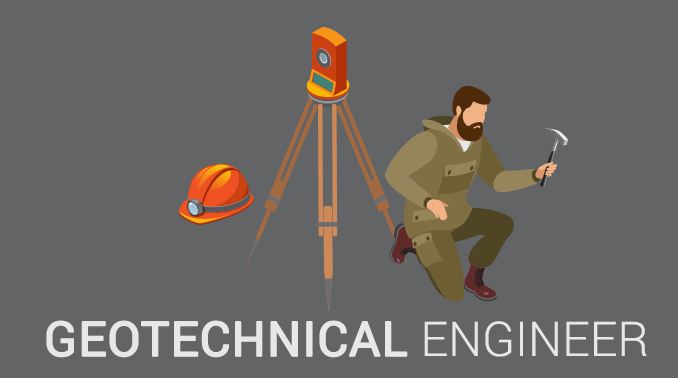The Greatest Guide To Geotheta
The Greatest Guide To Geotheta
Blog Article
The Best Guide To Geotheta
Table of ContentsHow Geotheta can Save You Time, Stress, and Money.The 7-Minute Rule for GeothetaAbout GeothetaGeotheta Things To Know Before You Get ThisNot known Facts About Geotheta

They perform website investigations, collect samples, carry out lab examinations, and analyze data to assess the suitability of the ground for building jobs - Engineer of Record. Based on their findings, geotechnical designers give suggestions for structure design, slope stability, maintaining structures, and mitigation of geotechnical risks. They work together with other experts, such as architects, structural designers, and construction groups, to make sure that geotechnical factors to consider are integrated into the general task style and application
By examining the habits and residential or commercial properties of dirt and rock, they can recognize possible geotechnical threats such as landslides, dirt negotiation, or incline instability. Their competence assists avoid failings or mishaps that could endanger lives and home. Below are some detailed obligations and responsibilities of a geotechnical engineer: Site Examination: Geotechnical engineers conduct website investigations to gather information on subsurface conditions.
They analyze the data to understand the residential properties and actions of the dirt and rock, including their stamina, leaks in the structure, compaction qualities, and groundwater problems. Geotechnical Evaluation and Style: Geotechnical engineers evaluate the information accumulated during site investigations to assess the security and viability of the site for construction projects. They perform geotechnical estimations and modeling to review variables such as birthing ability, settlement, slope stability, lateral planet pressures, and groundwater flow.
Excitement About Geotheta
Structure Design: Geotechnical engineers play a critical duty in designing foundations that can securely sustain the desired structure. They evaluate the dirt problems and lots demands to determine the appropriate structure kind, such as shallow foundations (e.g., footings), deep structures (e.g (https://filesharingtalk.com/members/599923-geotheta)., piles), or specialized methods like soil improvement. They consider variables such as settlement limits, bearing capacity, and soil-structure communication to establish optimum structure styles
They review construction plans, screen site activities, and perform area examinations to validate that the layout referrals are followed. If unforeseen geotechnical problems arise, they analyze the situation and provide referrals for removal or modifications to the layout. Risk Evaluation and Mitigation: Geotechnical engineers assess geotechnical risks and threats related to the job website, such as landslides, liquefaction, or soil disintegration.

Cooperation and Communication: Geotechnical engineers function carefully with various other professionals associated with a project, such as designers, architectural engineers, and construction groups. Reliable communication and collaboration are vital to integrate geotechnical considerations into the overall task style and building process. Geotechnical designers provide technological competence, response queries, and make sure that geotechnical requirements are met.
The Basic Principles Of Geotheta
Here are some types of geotechnical engineers: Foundation Designer: Foundation designers specialize in developing and analyzing structures for structures. They examine the soil conditions, lots demands, and website attributes to establish one of the most ideal structure kind and design, such as shallow structures, deep foundations, or specialized strategies like heap foundations.
They assess the factors influencing incline security, such as soil properties, groundwater problems, and incline geometry, and establish strategies to stop slope failings and alleviate risks. Quake Designer: Earthquake engineers focus on analyzing and developing frameworks to withstand seismic pressures. They examine the seismic danger of a site, evaluate dirt liquefaction capacity, and create seismic design requirements to make certain the security and durability of frameworks during quakes.
They do area screening, gather samples, and analyze the accumulated information to define the soil properties, geologic formations, and groundwater conditions at a website. Geotechnical Instrumentation Engineer: Geotechnical instrumentation designers focus on tracking and gauging the habits of soil, rock, and structures. They mount and keep instrumentation systems that keep track of elements such as soil negotiation, groundwater levels, incline movements, and architectural displacements to evaluate performance and offer early cautions of possible issues.
Excitement About Geotheta
They carry out tests such as triaxial tests, consolidation examinations, straight shear examinations, and permeability examinations to gather information for geotechnical evaluation and layout. Geosynthetics Designer: Geosynthetics designers specialize in the layout and application of geosynthetic products, such as geotextiles, geogrids, and geomembranes. They make use of these products to improve dirt stability, strengthen slopes, offer drain services, and control erosion.
They often tend to be investigative people, which indicates they're investigate this site intellectual, reflective, and inquisitive. They wonder, methodical, sensible, logical, and logical. A few of them are likewise social, indicating they're kind, generous, participating, person, caring, practical, understanding, sensible, and friendly. Does this noise like you? Take our free job examination to discover if geotechnical designer is one of your leading profession suits.
In the workplace atmosphere, geotechnical engineers make use of specialized software tools to carry out computations, produce designs, and evaluate information. They prepare reports, evaluation project requirements, connect with clients and staff member, and coordinate project activities. The office setup supplies a conducive atmosphere for study, evaluation, and partnership with other experts associated with the task.
Rumored Buzz on Geotheta
They often see project websites to conduct site investigations, analyze geotechnical conditions, and collect data for analysis. These visits entail taking a trip to different places, sometimes in remote or challenging terrains. Geotechnical engineers may execute dirt sampling, conduct tests, and monitor building tasks to make sure that the geotechnical facets of the task are being executed correctly.
Geotechnical engineers likewise work in specialized geotechnical labs. Geotechnical research laboratory designers work thoroughly in these atmospheres, taking care of screening tools, operating instruments, and videotaping data.
Report this page